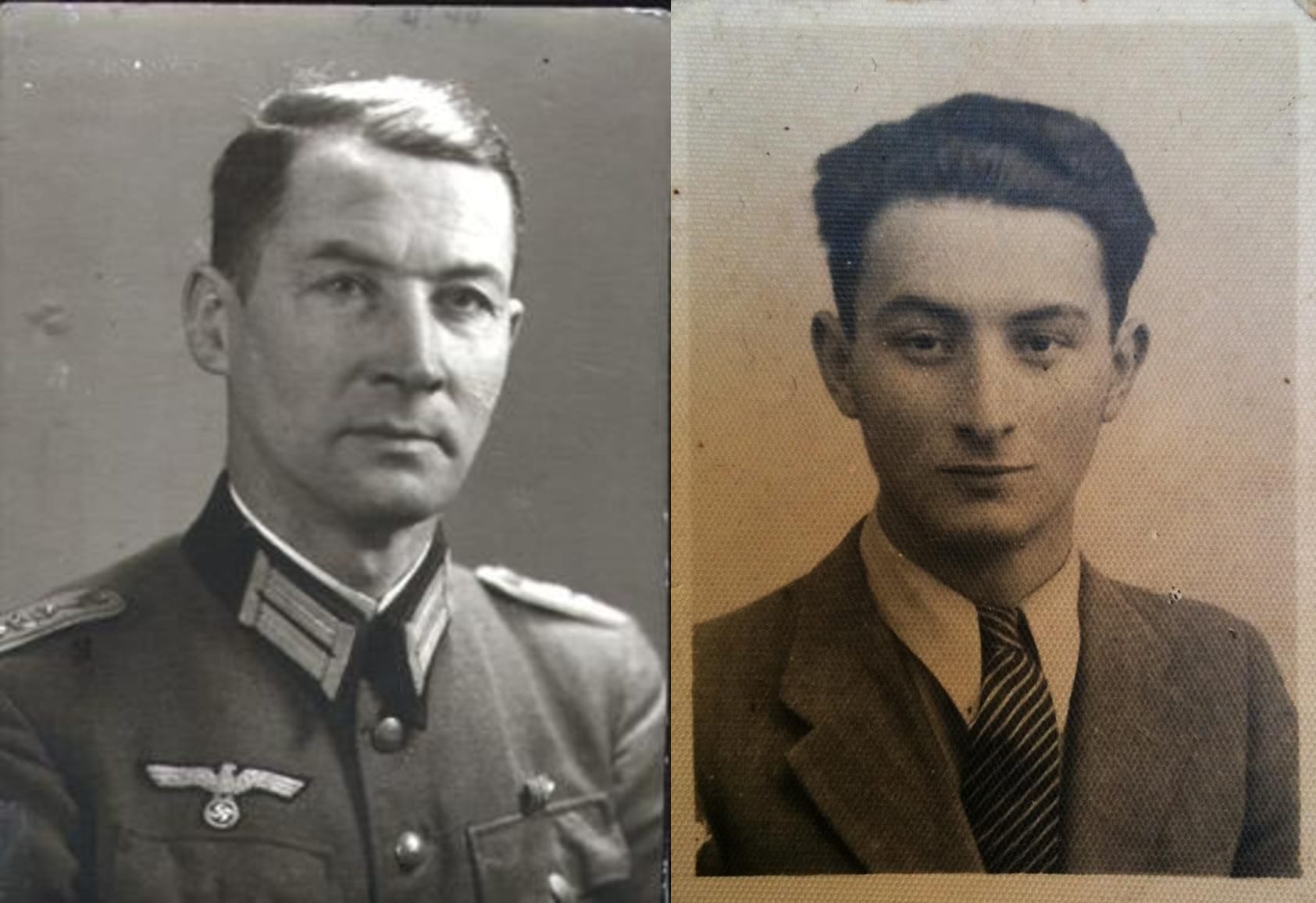A Nazi Officer’s Unexpected Compassion
In the heart of World War II, as the horrors of the Holocaust raged, a German officer named Wilm Hosenfeld stood apart, becoming an unexpected beacon of hope in Nazi-occupied Warsaw. His story, a testament to the complexities of human nature, challenges the simplistic narrative of good versus evil, revealing that compassion and courage can flourish even in the darkest of times.
You might recognize Hosenfeld from the film “The Pianist,” which depicts his remarkable act of saving Władysław Szpilman, a Polish-Jewish musician. However, Szpilman was just one of many individuals Hosenfeld shielded from the Nazi regime’s brutality. While initially sympathetic to the Nazi Party’s ideology, Hosenfeld’s beliefs were deeply shaken by the atrocities he witnessed in Warsaw. His diaries from this period document a profound transformation, expressing growing disgust and horror at the regime he served.
Risking Everything for Humanity
Driven by a burgeoning sense of moral responsibility, Hosenfeld began utilizing his position to aid those targeted by the Nazi regime. He provided shelter, shared his meager food rations, and even forged documents to help Jews and other persecuted individuals escape the grip of the Gestapo.
While the exact number remains unknown, it’s estimated that Hosenfeld helped save the lives of at least 60 individuals. His actions, often carried out in secrecy, put his own life and the well-being of his family at immense risk. It suggests that he was willing to sacrifice everything for the sake of his conscience.
A Tragic End and Posthumous Recognition
Unfortunately, Hosenfeld’s courage came at a great personal cost. Captured by Soviet forces in 1945, he was wrongly accused of war crimes and sentenced to 25 years of hard labor. Despite his pleas for clemency and evidence of his wartime heroism, Hosenfeld died in Soviet captivity in 1952, his story largely unknown to the world.
It wasn’t until decades later, spurred by the efforts of Szpilman and other survivors, that the truth about Hosenfeld’s actions came to light. His diaries, rediscovered by his family, revealed the depth of his humanitarian efforts and prompted a reassessment of his legacy. In 2009, Yad Vashem, Israel’s Holocaust remembrance authority, recognized Wilm Hosenfeld as one of the “Righteous Among the Nations,” a prestigious honor bestowed upon non-Jews who risked their lives to save Jews during the Holocaust.
The German Officer’s Fate
Analyzing the German Officer’s Fate in “The Pianist”: A Comprehensive SEO Approach
(Note: I’ve retained the suggested section titles and key lines as they are well-crafted and SEO-friendly. I’ve incorporated them into the article’s flow.)
Beyond “The Pianist”: The Untold Story of Wilm Hosenfeld, the Nazi Officer Who Saved Jews
Wilm Hosenfeld, the German officer who saved Władysław Szpilman’s life in “The Pianist,” died a captive of the very system he resisted, highlighting the tragic irony of his fate. Despite initially being drawn to the Nazi Party’s ideology, Hosenfeld’s experiences in occupied Warsaw sparked a profound moral shift, leading him to risk his life saving Jews, including Szpilman.
While “The Pianist” immortalized Hosenfeld’s heroism, his story remained largely unknown until after his death, prompting questions about whether more could have been done to save him. Hosenfeld’s story serves as a powerful reminder that even amidst the darkest chapters of history, individual acts of compassion and courage can shine through.
From Nazi Party Member to Holocaust Rescuer: The Complex Transformation of Wilm Hosenfeld
Hosenfeld’s journey from Nazi Party member to Holocaust rescuer is a testament to the transformative power of empathy and the complexities of human nature. Born in 1895, he wasn’t always opposed to Nazi ideology. In fact, he joined the Nazi party in 1935, likely swayed by their rhetoric of national revival. However, as the war progressed and Hosenfeld witnessed the brutality inflicted upon innocent civilians, particularly Jews, his perspective underwent a radical shift.
Could the “Pianist” Savior Have Done More to Stop the Holocaust?
This question, while impossible to answer definitively, encourages reflection on the limits of individual action within a system designed for genocide. While Hosenfeld’s actions were undoubtedly courageous, they raise questions about the role of bystanders and the collective responsibility to confront evil. Did he, could he, have done more to challenge the Nazi regime from within? This complex question continues to spark debate and introspection.
Unveiling the Hero of “The Pianist”: Wilm Hosenfeld
Beyond “The Pianist”: The Untold Story of Wilm Hosenfeld
Hosenfeld’s story extends far beyond his encounter with Szpilman. His diaries, filled with reflections and observations of the war’s impact on both victims and perpetrators, offer a unique window into the moral struggles of the time. These writings reveal a man grappling with his conscience and ultimately choosing humanity over blind allegiance.
The Nazi Officer Who Saved Jews: Wilm Hosenfeld’s Complex Legacy
Hosenfeld’s legacy is a study in contradictions—a Nazi officer who risked his life to save those his own government sought to exterminate. His story compels us to examine the nuances of individual morality within a system built on hatred and to recognize that even those complicit in evil can experience profound moral awakenings.
From Warsaw to Siberia: The Tragic Fate of Wilm Hosenfeld, Savior of “The Pianist”
The tragic irony of Hosenfeld’s fate—dying a prisoner of the Soviets after dedicating years to protecting others—underscores the devastating human cost of war and the often arbitrary nature of justice in times of conflict. His story serves as a stark reminder that even those who embody compassion and courage are not immune to the indiscriminate brutality of war.
Deconstructing “The Pianist” – Unveiling the German Officer and His Legacy
Beyond the Ruins of Warsaw: Hauptmann Wilm Hosenfeld, a German officer stationed in Nazi-occupied Poland, defied his nation’s ideology to become an unlikely beacon of hope during the Holocaust.
A Melody of Redemption: Hosenfeld’s rescue of Władysław Szpilman, immortalized in the film “The Pianist”, reveals the complex realities of war, highlighting the capacity for humanity even in the darkest of times.
From Nazi Party Member to Holocaust Rescuer: Hosenfeld’s transformation from a man initially drawn to Nazi promises to a disillusioned officer risking his life to save Jews offers a compelling study in moral evolution.
A Legacy Forged in the Fires of Genocide: Though Hosenfeld perished in Soviet captivity, his story continues to resonate, prompting reflection on individual responsibility and the enduring power of compassion.
Who was the soldier at the end of The Pianist? – wilm hosenfeld
Unveiling the Hero of “The Pianist”: Wilm Hosenfeld
In the poignant final scenes of “The Pianist,” as Władysław Szpilman hides, emaciated and terrified, in a bombed-out building, a German officer discovers his hiding place. This officer, far from embodying the cruelty Szpilman had come to expect, offers him food and a lifeline. This was no ordinary soldier; this was Wilm Hosenfeld.
Who is the German at the end of The Pianist? – wilm hosenfeld
Deconstructing “The Pianist” – Unveiling the German Officer and His Legacy
At the end of “The Pianist,” the German officer who finds Szpilman isn’t simply a plot device but a complex figure based on a real-life individual: Wilm Hosenfeld. Initially a Nazi Party member, Hosenfeld’s beliefs underwent a profound transformation as he witnessed the horrors inflicted upon the Polish people, especially the Jews. His encounter with Szpilman, far from being their first, marked a turning point in both their lives. Hosenfeld, already risking his life to help Jews, found himself deeply moved by Szpilman’s music, a testament to the power of art to transcend even the bleakest circumstances.
Internal Links:
Did you know that Sylvia Plath died in an oven? She was not the only one, Todd Kohlhepp also murdered people and buried them on his property.
Important Points:
- Early Life and Influences: Born into a devout Catholic family in 1895, Hosenfeld’s upbringing instilled in him a strong sense of compassion and empathy. His experiences serving in World War I further shaped his worldview, exposing him to the horrors of conflict.
- Moral Evolution: Hosenfeld’s journey highlights the capacity for moral growth and change, even in the face of immense societal pressure. His story challenges us to consider the complexities of individual motivations and the factors that can lead individuals to reject deeply ingrained beliefs.
- The Power of Testimony: The rediscovery of Hosenfeld’s diaries and Szpilman’s tireless advocacy played a pivotal role in bringing his story to light. These primary sources serve as powerful reminders of the importance of preserving individual narratives and confronting uncomfortable truths.
- Continuing Relevance: Hosenfeld’s story resonates deeply in a world still grappling with issues of intolerance, discrimination, and genocide. His actions serve as a timeless reminder of the importance of standing up for what is right, even when it is dangerous to do so.
- People’s Statements:
- “Are you hiding here?” – Wilm Hosenfeld to Władysław Szpilman when discovering him in hiding.
By weaving together these threads—Hosenfeld’s personal history, his acts of resistance, his tragic fate, and his posthumous recognition—you can create a powerful and informative article that sheds light on the extraordinary story of this unlikely hero.
















